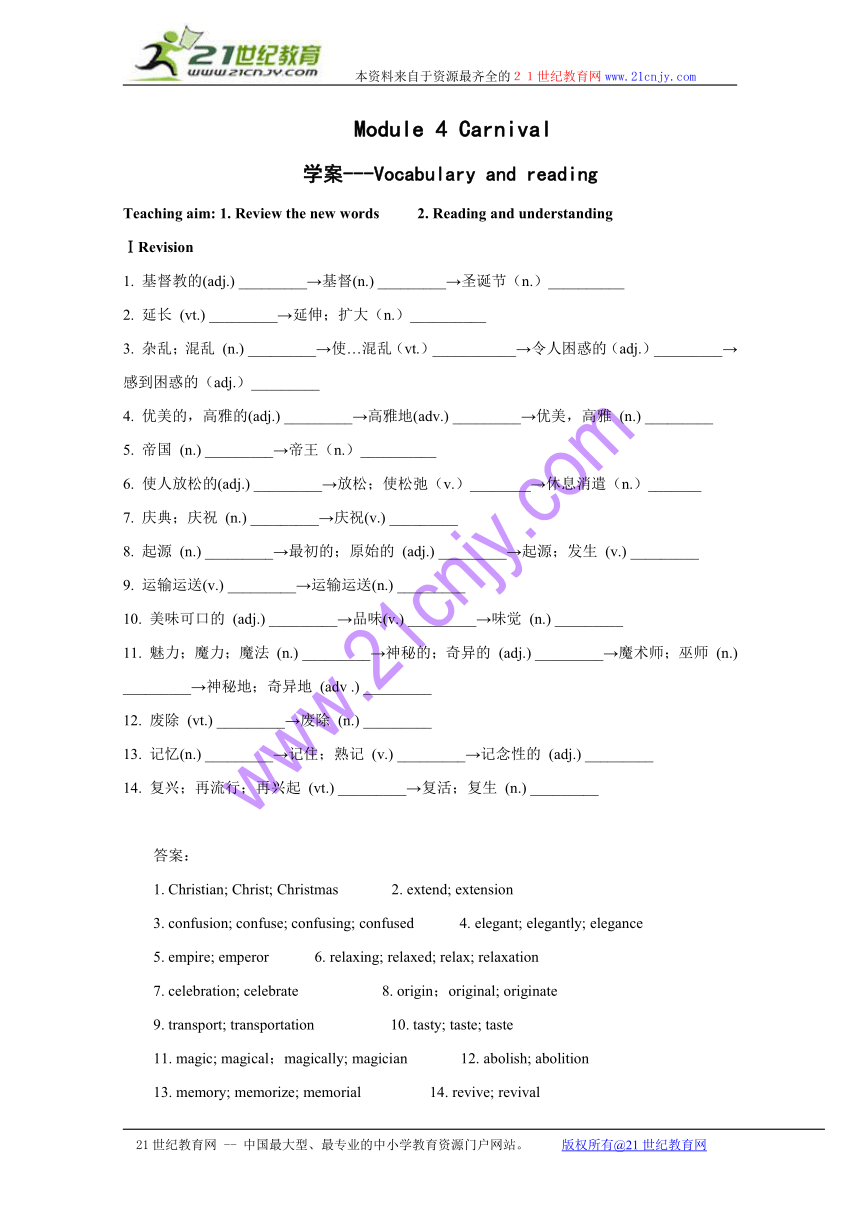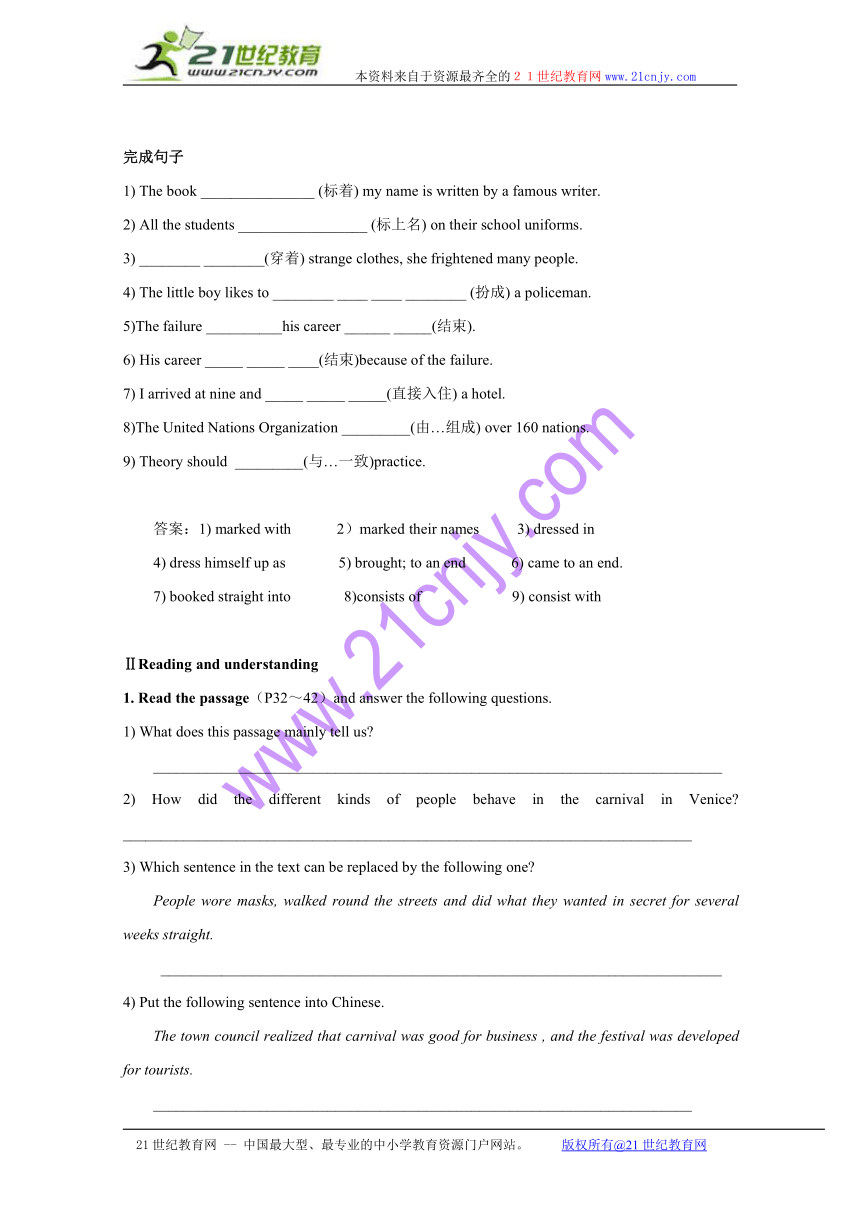英语:module 4《carnival》学案-vocabulary and reading(外研版必修5)
文档属性
| 名称 | 英语:module 4《carnival》学案-vocabulary and reading(外研版必修5) |

|
|
| 格式 | rar | ||
| 文件大小 | 13.9KB | ||
| 资源类型 | 教案 | ||
| 版本资源 | 外研版 | ||
| 科目 | 英语 | ||
| 更新时间 | 2009-07-07 00:00:00 | ||
图片预览


文档简介
本资料来自于资源最齐全的21世纪教育网www.21cnjy.com
Module 4 Carnival
学案---Vocabulary and reading
Teaching aim: 1. Review the new words 2. Reading and understanding
ⅠRevision
1. 基督教的(adj.) _________→基督(n.) _________→圣诞节(n.)__________
2. 延长 (vt.) _________→延伸;扩大(n.)__________
3. 杂乱;混乱 (n.) _________→使…混乱(vt.)___________→令人困惑的(adj.)_________→感到困惑的(adj.)_________
4. 优美的,高雅的(adj.) _________→高雅地(adv.) _________→优美,高雅 (n.) _________
5. 帝国 (n.) _________→帝王(n.)__________
6. 使人放松的(adj.) _________→放松;使松弛(v.)________→休息消遣(n.)_______
7. 庆典;庆祝 (n.) _________→庆祝(v.) _________
8. 起源 (n.) _________→最初的;原始的 (adj.) _________→起源;发生 (v.) _________
9. 运输运送(v.) _________→运输运送(n.) _________
10. 美味可口的 (adj.) _________→品味(v.) _________→味觉 (n.) _________
11. 魅力;魔力;魔法 (n.) _________→神秘的;奇异的 (adj.) _________→魔术师;巫师 (n.) _________→神秘地;奇异地 (adv .) _________
12. 废除 (vt.) _________→废除 (n.) _________
13. 记忆(n.) _________→记住;熟记 (v.) _________→记念性的 (adj.) _________
14. 复兴;再流行;再兴起 (vt.) _________→复活;复生 (n.) _________
答案:
1. Christian; Christ; Christmas 2. extend; extension
3. confusion; confuse; confusing; confused 4. elegant; elegantly; elegance
5. empire; emperor 6. relaxing; relaxed; relax; relaxation
7. celebration; celebrate 8. origin;original; originate
9. transport; transportation 10. tasty; taste; taste
11. magic; magical;magically; magician 12. abolish; abolition
13. memory; memorize; memorial 14. revive; revival
完成句子
1) The book _______________ (标着) my name is written by a famous writer.
2) All the students _________________ (标上名) on their school uniforms.
3) ________ ________(穿着) strange clothes, she frightened many people.
4) The little boy likes to ________ ____ ____ ________ (扮成) a policeman.
5)The failure __________his career ______ _____(结束).
6) His career _____ _____ ____(结束)because of the failure.
7) I arrived at nine and _____ _____ _____(直接入住) a hotel.
8)The United Nations Organization _________(由…组成) over 160 nations.
9) Theory should _________(与…一致)practice.
答案:1) marked with 2)marked their names 3) dressed in
4) dress himself up as 5) brought; to an end 6) came to an end.
7) booked straight into 8)consists of 9) consist with
ⅡReading and understanding
1. Read the passage(P32~42)and answer the following questions.
1) What does this passage mainly tell us
___________________________________________________________________________
2) How did the different kinds of people behave in the carnival in Venice ___________________________________________________________________________
3) Which sentence in the text can be replaced by the following one
People wore masks, walked round the streets and did what they wanted in secret for several weeks straight.
__________________________________________________________________________
4) Put the following sentence into Chinese.
The town council realized that carnival was good for business , and the festival was developed for tourists.
_______________________________________________________________________
5) What’s the key character to carnival in Venice
__________________________________________________________________________
答案:
1) The origins of carnival and carnival in Venice.
2) Ordinary people could pretend to be rich and important, while famous people could have romantic adventures in secret. Many crimes went unnoticed.
3) For weeks on end people walked round the streets wearing masks, doing what they wanted without being recognized.
4) 市镇议会认识到狂欢节创造了一定的商机,因此狂欢节得以发展吸引更多的顾客。
5) The mystery of the mask.
2. According to the following points, rewrite the passage into a 120--word passage.
● the origin of carnival and its meaning
● carnival in Venice: one day, limited, banned, revised, developed for tourists, masks Fill in the blanks according to the story.
Example
When carnival began in Europe, people saw it as the last chance to have fun. Having fun meant eating, drinking and dressing up. The most famous carnival was in Venice. At first, it lasted for one day. As time passed , the carnival period was extended. People walking round the streets wearing masks, doing what they wanted without being recognized. Later, wearing masks was limited by law. Finally, at the end of the 18th century, masks were banned completely. But in the late 1970s, the tradition was revived by students and festival was developed for tourists. Today carnival in Venice is celebrated for five days in February. Hotels are fully booked and the narrow streets are crowded with wonderful costumes. The key to carnival in Venice is the mystery of masks.
3. Complete the following passage.
Think of carnival, and you t 1 crowds, costumes, and confusion. “Carnival” comes from two Latin words m____2_____ “no more meat”. People saw carnivals as a last c_____3____ to have fun at the end of winter season.
The most famous carnival in Europe was in Venice. For works on e_____4__, people w____5_masks did what they wanted without being r____6__, so that many crimes went u____7_.
The government realized the problem and made laws to solve it. Masks were b_____8____completely. But in the late 1970s the tradition was r_____9____by students.
Today, carnival in Venice is c____10_____ for five days in February. As you w 11 through the streets, you see thousands of masks. However, nobody takes them off. If masks come off, the m 12 is lost.
答案:
1. think of 2. meaning 3. chance 4. end 5. wearing
6. recognised 7. unpunished 8. banned 9. revived
10. celebrated 11. wander 12. magic
21世纪教育网 -- 中国最大型、最专业的中小学教育资源门户网站。 版权所有@21世纪教育网
Module 4 Carnival
学案---Vocabulary and reading
Teaching aim: 1. Review the new words 2. Reading and understanding
ⅠRevision
1. 基督教的(adj.) _________→基督(n.) _________→圣诞节(n.)__________
2. 延长 (vt.) _________→延伸;扩大(n.)__________
3. 杂乱;混乱 (n.) _________→使…混乱(vt.)___________→令人困惑的(adj.)_________→感到困惑的(adj.)_________
4. 优美的,高雅的(adj.) _________→高雅地(adv.) _________→优美,高雅 (n.) _________
5. 帝国 (n.) _________→帝王(n.)__________
6. 使人放松的(adj.) _________→放松;使松弛(v.)________→休息消遣(n.)_______
7. 庆典;庆祝 (n.) _________→庆祝(v.) _________
8. 起源 (n.) _________→最初的;原始的 (adj.) _________→起源;发生 (v.) _________
9. 运输运送(v.) _________→运输运送(n.) _________
10. 美味可口的 (adj.) _________→品味(v.) _________→味觉 (n.) _________
11. 魅力;魔力;魔法 (n.) _________→神秘的;奇异的 (adj.) _________→魔术师;巫师 (n.) _________→神秘地;奇异地 (adv .) _________
12. 废除 (vt.) _________→废除 (n.) _________
13. 记忆(n.) _________→记住;熟记 (v.) _________→记念性的 (adj.) _________
14. 复兴;再流行;再兴起 (vt.) _________→复活;复生 (n.) _________
答案:
1. Christian; Christ; Christmas 2. extend; extension
3. confusion; confuse; confusing; confused 4. elegant; elegantly; elegance
5. empire; emperor 6. relaxing; relaxed; relax; relaxation
7. celebration; celebrate 8. origin;original; originate
9. transport; transportation 10. tasty; taste; taste
11. magic; magical;magically; magician 12. abolish; abolition
13. memory; memorize; memorial 14. revive; revival
完成句子
1) The book _______________ (标着) my name is written by a famous writer.
2) All the students _________________ (标上名) on their school uniforms.
3) ________ ________(穿着) strange clothes, she frightened many people.
4) The little boy likes to ________ ____ ____ ________ (扮成) a policeman.
5)The failure __________his career ______ _____(结束).
6) His career _____ _____ ____(结束)because of the failure.
7) I arrived at nine and _____ _____ _____(直接入住) a hotel.
8)The United Nations Organization _________(由…组成) over 160 nations.
9) Theory should _________(与…一致)practice.
答案:1) marked with 2)marked their names 3) dressed in
4) dress himself up as 5) brought; to an end 6) came to an end.
7) booked straight into 8)consists of 9) consist with
ⅡReading and understanding
1. Read the passage(P32~42)and answer the following questions.
1) What does this passage mainly tell us
___________________________________________________________________________
2) How did the different kinds of people behave in the carnival in Venice ___________________________________________________________________________
3) Which sentence in the text can be replaced by the following one
People wore masks, walked round the streets and did what they wanted in secret for several weeks straight.
__________________________________________________________________________
4) Put the following sentence into Chinese.
The town council realized that carnival was good for business , and the festival was developed for tourists.
_______________________________________________________________________
5) What’s the key character to carnival in Venice
__________________________________________________________________________
答案:
1) The origins of carnival and carnival in Venice.
2) Ordinary people could pretend to be rich and important, while famous people could have romantic adventures in secret. Many crimes went unnoticed.
3) For weeks on end people walked round the streets wearing masks, doing what they wanted without being recognized.
4) 市镇议会认识到狂欢节创造了一定的商机,因此狂欢节得以发展吸引更多的顾客。
5) The mystery of the mask.
2. According to the following points, rewrite the passage into a 120--word passage.
● the origin of carnival and its meaning
● carnival in Venice: one day, limited, banned, revised, developed for tourists, masks Fill in the blanks according to the story.
Example
When carnival began in Europe, people saw it as the last chance to have fun. Having fun meant eating, drinking and dressing up. The most famous carnival was in Venice. At first, it lasted for one day. As time passed , the carnival period was extended. People walking round the streets wearing masks, doing what they wanted without being recognized. Later, wearing masks was limited by law. Finally, at the end of the 18th century, masks were banned completely. But in the late 1970s, the tradition was revived by students and festival was developed for tourists. Today carnival in Venice is celebrated for five days in February. Hotels are fully booked and the narrow streets are crowded with wonderful costumes. The key to carnival in Venice is the mystery of masks.
3. Complete the following passage.
Think of carnival, and you t 1 crowds, costumes, and confusion. “Carnival” comes from two Latin words m____2_____ “no more meat”. People saw carnivals as a last c_____3____ to have fun at the end of winter season.
The most famous carnival in Europe was in Venice. For works on e_____4__, people w____5_masks did what they wanted without being r____6__, so that many crimes went u____7_.
The government realized the problem and made laws to solve it. Masks were b_____8____completely. But in the late 1970s the tradition was r_____9____by students.
Today, carnival in Venice is c____10_____ for five days in February. As you w 11 through the streets, you see thousands of masks. However, nobody takes them off. If masks come off, the m 12 is lost.
答案:
1. think of 2. meaning 3. chance 4. end 5. wearing
6. recognised 7. unpunished 8. banned 9. revived
10. celebrated 11. wander 12. magic
21世纪教育网 -- 中国最大型、最专业的中小学教育资源门户网站。 版权所有@21世纪教育网
